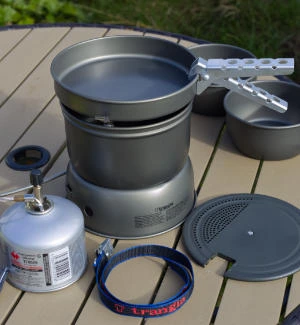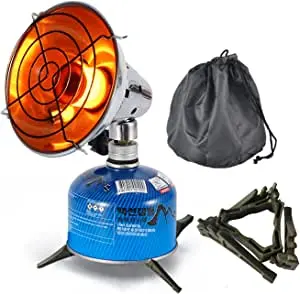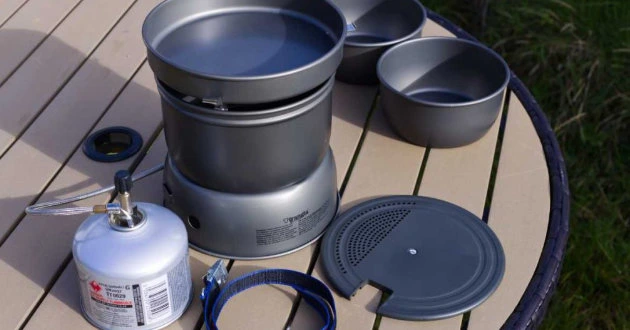As a Professional Chef and experienced camper, I know how important it is to choose the right stove when camping. Choosing the right fuel is very important to get the most out of your stove and ensure it works when needed. Which is best, Butane or Propane?
Butane is best for all-year camping unless temperatures go below freezing. Propane works best in freezing temperatures. Butane is also more efficient than Propane while Butane canisters are lighter and often cheaper.
In this article, I will detail the differences between a propane and butane stove and tell you which one I think is best. I will also tell you which one I prefer to use and give you an alternative gas that I believe is better.
Butane vs Propane. Which is Best?
When it comes to camping, there are a few things you need to consider before deciding what type of stove to bring along. One of the significant decisions you’ll have to make is whether to bring a propane or butane stove.

What are Propane and Butane?
Propane and Butane are hydrocarbons and are both made of hydrogen and carbon. They each have their benefits and drawbacks, which I will discuss in this article.
What is Propane
Propane is a hydrocarbon that is made of hydrogen and carbon. It is often used as fuel for stoves, heaters, and vehicles. It is heavier than air, so it will sink to the ground if released into the environment.
What is Butane
Butane is also a hydrocarbon that is made of hydrogen and carbon. It is often used as fuel for stoves, heaters, and vehicles. It is lighter than air, so it will rise to the top if released into the environment.
Boiling Point of Propane vs Butane
At room temperature, Propane has a boiling point of -42 degrees Fahrenheit (-42 Celsius), while Butane has a boiling point of 31 degrees Fahrenheit (-1 Celsius), which means that Propane will start to vaporize at a lower temperature than Butane.
This is important to consider when using a camping stove, as you want the fuel to vaporize as quickly as possible to create a hot flame.
Propane is a better choice for camping in freezing cold weather conditions, as its boiling point is lower than Butane. However, Butane is lighter than Propane, so it may be a better choice for backpacking trips where weight is a consideration.
Which is safer, Propane or Butane?
Propane and Butane are safe to use, but you should keep a few things in mind when using them.
Propane is heavier than air, so it will sink to the ground if released into the environment. Butane is lighter than air, so it will rise to the top if released into the environment. This is important to consider when using a stove, as you want the fuel to vaporize as quickly as possible to create a hot flame.
Propane is a safer choice than Butane, as it is less likely to create an explosive atmosphere.
The efficiency of Propane vs Butane
Propane and Butane are efficient fuels, but there are a few things to consider when deciding which is better for you.
When it comes to efficiency, Butane wins over Propane each time. Butane produces 12% more energy compared to Propane per weight. Meaning, if you have 1ltr (approx 34oz) of Butane and Propane, your Butane gas will last you much longer than Propane.

Cold Weather Conditions in the UK
During the winter, the average temperature in the United Kingdom (UK) is between 7 and 2 degrees Celsius (45 and 35 degrees Fahrenheit). The lowest temperature recorded in the UK was in 1982 in Scotland, where temperatures dropped to -27.2C (-16F).
Using Butane gas under the average winter temperature will work perfectly fine, but if you are camping outside in the winter in the UK. Where temperatures go below freezing, you are probably better to pick a propane gas canister to ensure a reliable heat source.
If you are enjoying this post so far, why not check out my post on comparing the Trangia Spirit stove vs Trangia Gas Stove. Both these stoves are fantastic with camping gas and spirits and I would highly recommend either.
Which is better for camping – Propane or Butane?
There are pros and cons to using both Propane and Butane for camping. Let’s take a look at some of the key differences between these two fuels:
- Propane works better than Butane in freezing temperatures. Butane has a lower boiling point than Propane, so it will start to vaporize at a lower temperature. This means that your propane stove will likely still work in icy weather conditions while your butane stove may not.
- Butane is more efficient than Propane. A butane canister will typically last longer than a propane canister of the same size.
- Butane Canisters are lighter than Propane Canisters. A typical butane canister weighs about 11 ounces, while a propane canister weighs about 19 ounces.
- Butane is often cheaper than Propane. Prices for Butane can vary depending on where you live, but it is usually cheaper than Propane.

Alternatives to Propane and Butane for Camping
In my opinion, the best form of gas to use for your camping stove is a mixture of both Propane and Butane.
You can buy camping gas that comes in a mixture of Butane and Propane, which generally comes in a mix of 70/30 Butane to Propane.
As well as Butane and Propane mix, you can get an Isobutane and Propane mix which usually is my gas of choice.
Isobutane for Camping
Isobutane is another fuel that can be used in camping stoves. It has a boiling point of about -1.8 degrees Celsius (-28.8 degrees Fahrenheit), which means it can be used in colder weather conditions than Butane.
Isobutane is more efficient than Propane. A typical isobutane canister will last longer than a propane canister of the same size.
Isobutane vs Butane
Isobutane vs Butane is a debate that many campers have. Some say that Isobutane is better because it doesn’t have the bad taste that Butane has. It also doesn’t produce as much of a smell.
However, Butane is a little bit cheaper than Isobutane. Isobutane works a little better than Butane in cold weather conditions because it doesn’t freeze as quickly. Butane also burns a bit more cleanly than Isobutane.

Which Gas is Best for Camping
In my opinion, Butane gas is the best all-around camping gas you can buy in the warmer months. It will last much longer than Propane gas and is cheaper and lighter to carry.
If you want to go winter camping, I would choose a mixture of Isobutane and Propane. The benefit of choosing a mix is that you will have a gas canister that will work in cold temperatures as both Isobutane and Propane work below freezing.
Using a mix of Isobutane and Propane, you also get the benefit of having a lightweight gas canister which is perfect for camping. Isobutane and Propane are commonly mixed in an 80/20 ratio of Isobutane to Propane. This means that less pressure is required for storage with less Propane so that lighter canister material can be used.
Using a mix of Isobutane and Propane in the Winter means you are always guaranteed that your gas will work. Picking the suitable gas for the weather is essential, and if the temperature doesn’t drop below freezing, Butane should always be your choice.
Outdoor Personal Chef is a participant in the Amazon Services LLC Associates Program, an affiliate advertising program designed to provide a means for sites to earn advertising fees by advertising and linking to Amazon.com. We also participate in other affiliate programs which compensate us for referring traffic.
